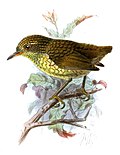| Melanocharis | |
|---|---|
 | |
| Black berrypecker (Melanocharis nigra) | |
| Scientific classification | |
| Kingdom: | Animalia |
| Phylum: | Chordata |
| Class: | Aves |
| Order: | Passeriformes |
| Family: | Melanocharitidae |
| Genus: | Melanocharis P.L. Sclater, 1858 |
| Type species | |
| Dicaeum niger [1] Lesson, 1830 | |
| Synonyms | |
Rhamphocharis Salvadori, 1876 | |
Melanocharis is a genus of birds in the berrypecker and longbill family Melanocharitidae that are endemic to New Guinea.
